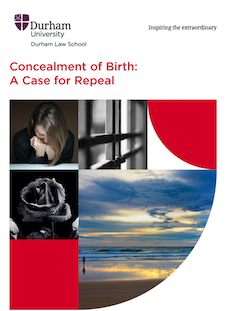Concealment of Birth: A Case for Repeal
In this briefing, Dr Milne outlines why the criminal offence of concealment of birth should be removed from the criminal law.
 The offence of concealment of birth criminalises the secret disposal of the dead body of an infant to conceal knowledge of that child’s birth. The legislation was enacted in 1861 (Offences Against the Person Act, s60), at a time when women lacked legal parity with men. While concealment of birth can be committed by anyone, the defendant is most often the woman who birthed the child. Research, by Durham University, into contemporary cases, indicates that the offence is being used to obtain convictions in cases where women are suspected of causing the death of an infant, before or after birth, but a conviction for murder or for the crime of child destruction cannot be obtained due to lack of evidence. Application of the offence in these cases indicates a misuse of the criminal law.
The offence of concealment of birth criminalises the secret disposal of the dead body of an infant to conceal knowledge of that child’s birth. The legislation was enacted in 1861 (Offences Against the Person Act, s60), at a time when women lacked legal parity with men. While concealment of birth can be committed by anyone, the defendant is most often the woman who birthed the child. Research, by Durham University, into contemporary cases, indicates that the offence is being used to obtain convictions in cases where women are suspected of causing the death of an infant, before or after birth, but a conviction for murder or for the crime of child destruction cannot be obtained due to lack of evidence. Application of the offence in these cases indicates a misuse of the criminal law.
While the conduct of concealing the dead body of a newly born child has the potential to cause harm – notably due to public health concerns and by preventing an investigation into the cause of the child’s death – other offences exist that more appropriately and accurately label the corresponding wrongful act. Consequently, the offence of concealment of birth is no longer needed. Furthermore, application of the offence to capture other suspected, but unproven crimes is resulting in injustices for vulnerable women who experience “crisis pregnancies”.
We recommend:
Section 60 of the Offences Against the Person Act 1861 is repealed to remove the offence of concealment of birth from the criminal law.
Read the briefing: Concealment of Birth: A Case for Repeal.
Published: February 2023


/prod01/prodbucket01/media/durham-university/departments-/law-school/37038.jpg)
/prod01/prodbucket01/media/durham-university/research-/research-centres/centre-for-gender-and-law/Cover-cropped-big.jpg)
/prod01/prodbucket01/media/durham-university/research-/research-centres/centre-for-gender-and-law/EmmaMilneColour1-copy-200X251.jpg)
/prod01/prodbucket01/media/durham-university/research-/research-centres/durham-european-law-institute/45878.jpg)
/prod01/prodbucket01/media/durham-university/research-/research-centres/centre-for-gender-and-law/pexels-sam-jean-1764956.jpg)